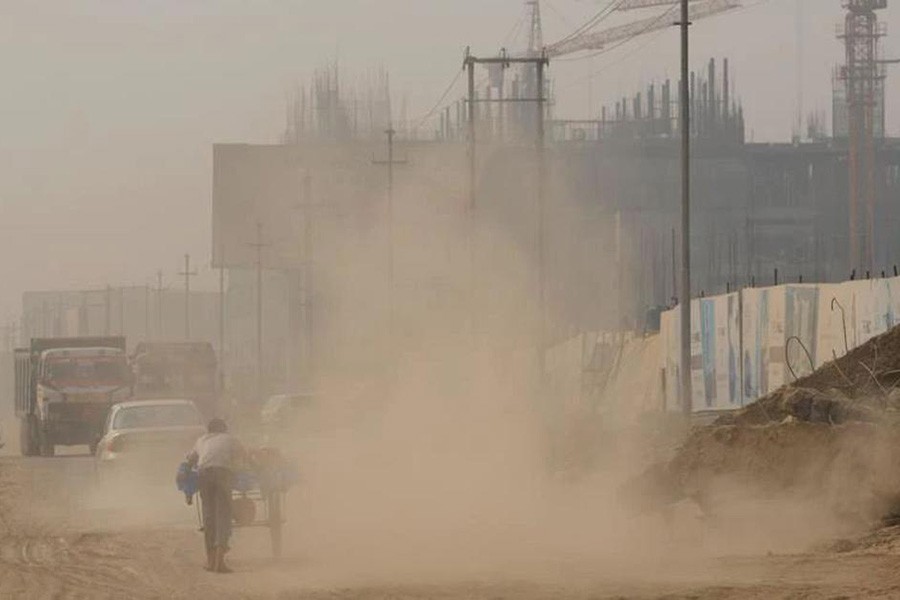
Published :
Updated :

The January 30 announcement of a drive by DSCC (Dhaka South City Corporation) to fight the menace of Dhaka's dust by spraying water is a timely step. So it seems. The dry season has already set in. Acting in response to a High Court order to keep Dhaka free of air pollution, the DSCC mayor has said mobile courts will soon be pressed into operation for this purpose twice a week. They will be assigned to bring to justice people responsible for the city's air pollution. Besides, the DSCC authorities have made another announcement of spraying water on 51 kilometres of Dhaka roads in the coming days to keep them dust-free.
The occasion for announcing the programme was undoubtedly appropriate. The mayor was launching a water-spraying programme on the day on the premises of Bangla Academy prior to the start of its month-long Ekushey Book Fair. Like in the recent years, it will be held at two venues --- one at the sprawling Suhrawardy Udyan book fair compound and the space around Bangla Academy. The announcement of the DSCC mayor assumes special significance due to the fact of the stifling dust being a great hindrance to book lovers at the fair ground. With the book fair compound remaining free of the hazard of dust, the month-long event is expected to get back its earlier attraction. Since its launch in a massive shape, the February event has emerged as one of the greatest literary-cultural events in the country. The menace of dust thanks to increasing numbers of fair visitors had robbed the book fair of much of its appeal. Lots of people were seen cutting the frequency of their visit to the annual fair due to the nuisance of dust in the air. The menace could be cut down significantly in the last couple of years by taking preventive measures, including water-spraying. The renewed anti-dust pollution drive by DSCC, optimists hope, will eventually make the scourge a thing of the past. The High Court was unambiguous in its order to the two city corporations on keeping Dhaka pollution-free. It directed the authorities concerned to act within 15 days, and cautioned them against further pollution of the city air caused by development and repair works. As a remedy, the higher court directed the relevant authorities to spray water twice a day in the dust-dominant areas.
Against the backdrop of the dust-related miseries caused to the city-dwellers in the recent days, the HC order couldn't have been timelier. Air-borne dust in the post-winter windy days makes life unbearable every year in the city of Dhaka. Those suffering from asthma, bronchial diseases and respiratory problems dread this season's onslaught on the capital. Except the city-centre, almost the whole of Dhaka and its peripheral areas are exposed to dust and mud. A brief spell of windy weather whips up dust. However, the most glaringly noticeable menace of dust has its roots in the urban development and repair works.
As part of an old tradition of this city, digging and construction works related to roads and underground utility lines are taken up during this lean time. With little rain and dryness of the air, loose dust comes off from construction and repair sites in a relatively strong wind. As part of another practice in this city, the digging and construction works are most of the time left unfinished. Prompt filling of the trenches dug for laying out utility service pipes is rarely seen. Works left sloppily finished are seen in every part of the capital. They constitute a sight that continues for months in a row. That this style of digging and construction works is chiefly responsible for the persisting presence of air-borne dust in Dhaka is not unknown to the authorities concerned. But it's on few occasions that they are seen swinging into action.
At present, the two city corporations are busy finishing the work of the elevated metro rail work. Starting from Uttara to the Paltan area before the destination of Bangladesh Bank via Shahbagh and the Dhaka University campus, a vast area is at present witnessing the metro rail construction work. As a result, a large segment of Dhaka now remains in the grip of flying dust that contains various pollutants. Many people susceptible to dust allergy and other forms of air pollution are scared to come out in the open. Meanwhile, with the slow pace of the metro-line digging work and the old practice of leaving works unfinished in place, the project runs the risk being delayed. What boils down to is an extended period of sufferings caused by dust pollution.
This sort of development in the already dust-battered capital is feared to add to the overall worsening of its air pollution; the latter mainly caused by the countless factories in and around the city.
DSCC has a plan to spray water on 51 kilometres of roads on a regular basis to fight dust. But given the intricate network of roads and the neighbourhood alleys in the city, the fruits borne by keeping the roads drenched at intervals are anybody's guess. Few will dispute the sincerity of the two city corporations in keeping Dhaka free of air, particularly dust pollution. What might pique many is the implementation of the project. Considering the nature of project execution works, mere flushing out the roads may not suffice. In such a situation, the authorities have little options, except becoming proactive in implementing their urban plans.


 For all latest news, follow The Financial Express Google News channel.
For all latest news, follow The Financial Express Google News channel.